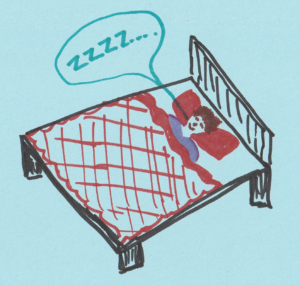
In my previous post I talked about some of the practicalities that can help foster a good night’s sleep. At the end of the day (groan at pun), choosing the best pillow or mattress for ourselves is only part of the story. At some point in our lives, most of us will struggle with sleep and, for certain people, insomnia is a constant problem. I had 10 years of waking up every 2 hours with a hot flush. It’s not so much of an issue for me now but I can still occasionally have nights where it takes a couple of hours to get to sleep, or I’m awake in the middle of the night for an hour or two. Sometimes there’s something we just can’t stop thinking about, and other times we find ourselves wide awake for who knows what mysterious reason.
Why do we find not getting to sleep so deeply frustrating? I think part of the problem is we’ve been encouraged from early life to try harder when we encounter a problem. So, if we don’t fall asleep quickly, we really ‘try’ to get to sleep, then become exasperated when this doesn’t work. Our cultural tendency to see things in absolutes also doesn’t help – black or white, right or wrong, this works or it doesn’t work. This can mean that we assume the only alternatives are being awake and restless, or fast asleep and resting.
When we’re able to start to gently tease ourselves away from these lines of thinking, other options can open up. This is one of the many things the Alexander Technique can offer. We learn how we can change how we think so that we’re not just stuck in habitual trains of thought. We can lessen our ‘endgaining’ tendency so that, rather than fixating uselessly on our desired goal of sleep, we can use our time more productively. When we use our mental space for Alexander thinking (‘inhibiting’ and ‘directing’), we have less room for the repetitive thoughts that are impeding the possibility of sleep. Instead, we are engaged in a process of quietening our over-active mind-bodies so that, even if still awake, it will be restorative rest. The Alexander Technique is no magic bullet but, if we choose to use it, we will probably find ourselves more refreshed in the morning than we would otherwise have.
If getting to sleep is the main problem for you, you might like to try the Alexander active rest just before getting into bed (see here and here). Some people find this a really helpful way of ‘winding down’, so that once you’re in bed you’re in a state more conducive for sleep. Also, the quality of sleep will tend to reflect our state while awake. So spending time quietening ourselves through the active rest will feed into a better quality of sleep.